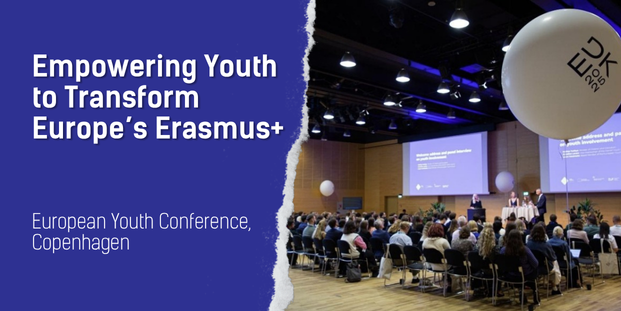
The Erasmus Student Network took part in the European Youth Conference (EUYC) held in Copenhagen, Denmark, from 21st to 23rd September 2025, under the Danish Presidency of the Council of the European Union. Bringing together more than 170 participants, including national youth delegates, ministry representatives, and international youth organisations, the event was part of the 11th Cycle of the EU Youth Dialogue — whose overall theme focuses on Connecting the EU with Youth.
In this specific conference, the discussions centred on developing recommendations for the future Erasmus+ Programme within the next Multiannual Financial Framework (MFF) 2028-2034, aiming to ensure that young people’s perspectives directly build EU policy priorities for the coming years.
Contributing Youth Voices to EU Policy
The European Youth Conference provides a structured platform for young people and organisations to influence EU policy. In Copenhagen, ESN joined as part of the group of International Non-Governmental Youth Organisations (INGYOs), coordinated by the European Youth Forum and alongside AEGEEEurope, WOSM, ATD Fourth World, and IGLYO. Representing ESN, Nathan Lusseau, Liaison Officer for Youth Affairs, brought the network’s perspective on international mobility, inclusion, and student support, topics central to ESN’s long-standing advocacy.

ESN’s Role and Impact
During the three-day event, participants collaborated in eight thematic working groups addressing different aspects of the upcoming Erasmus+ programme. ESN contributed to the “Erasmus+ and Formal Education” group, where discussions centred on accessibility, funding, and cooperation between education and youth sectors.
Drawing from ESN’s policy document The Future Is Erasmus: Recommendations for an improved Erasmus+ Programme 2028-2034, the network advocated for pre-payment of Erasmus+ mobility grants to reduce financial barriers for students. This proposal was included among the final eight recommendations adopted by the youth delegates and featured in the official policy paper presented to EU institutions. The decision highlights the recognition of ESN’s expertise in improving the Erasmus+ experience and ensuring equal access to mobility opportunities. By helping shape the dialogue on the future Erasmus+ programme, ESN reaffirmed its leadership role among youth organisations at the European level.
Looking Ahead
ESN’s participation also underscored the importance of strong, coordinated contributions from international youth organisations within EU-level discussions. Their collective input remains essential to ensuring that transnational perspectives inform the future of Erasmus+ and youth policy.
Building on the momentum of the Copenhagen conference, ESN will keep promoting the youth-driven recommendations and collaborating with EU institutions and partners to make Erasmus+ more accessible and sustainable. Our organisation remains committed to ensuring that the voices of students and young people shape the policies that define Europe’s future in education and mobility.
The next and final conference of the cycle will take place in Cyprus, where youth delegates will consolidate the cycle’s outcomes into final inputs for EU decision-makers as the process concludes.

Follow ESN